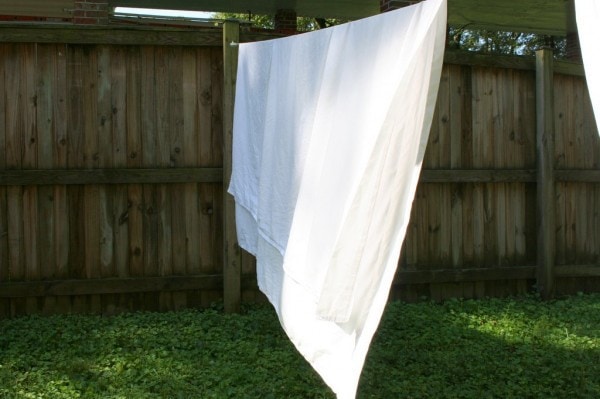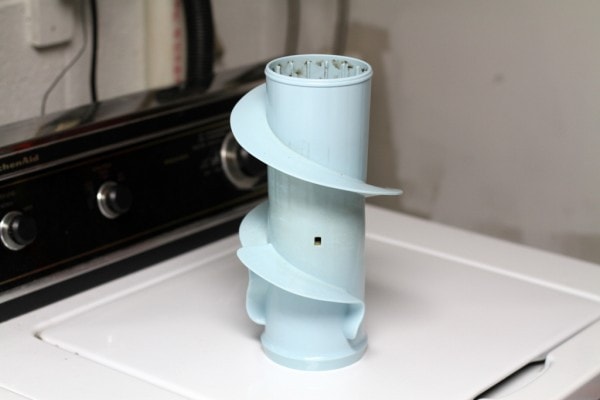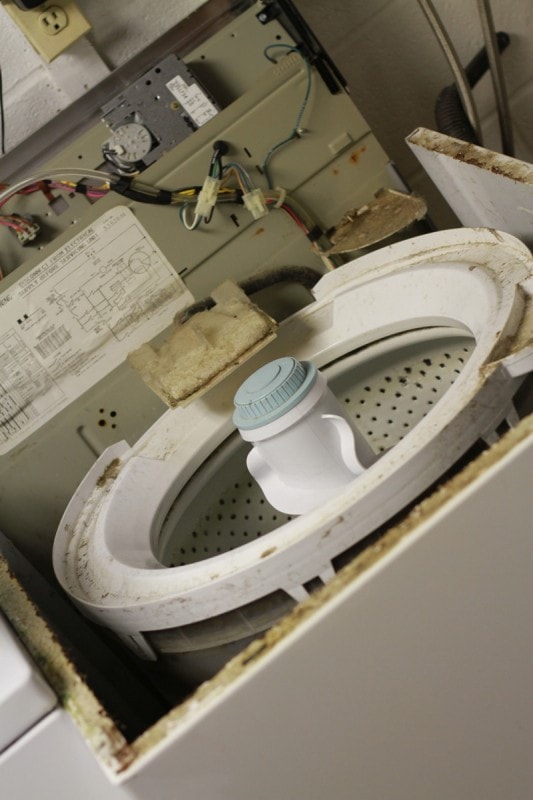On Monday, I posted about how we got our old washing machine repaired, and about how we plan to keep going that route as long as possible, since the washer is sturdy and should be repairable for a good long time.

So then in the comments section, we started talking about the fact that older washers do use more water than new ones, and that made me sort of stop and wonder if I’m really doing the right thing by fixing our old one.
(Obviously on the economic front, repairing is a win because our whole water bill for the entire household for an entire year is less than $250. So even if a new washer cut our household’s water bill in half*, it would take FOREVER to pay for a new washer!)
*This is a generous estimate because the new machines are supposed to use 10-50% less water, and I am positive our washer usage does not make up even half of our water bill.
I did some poking around on the interwebs and found a distressing number of articles that suggested we green up our lives by replacing all of our appliances.
(!!!)
If our washer was unrepairable, then I’d definitely buy an energy efficient model, but it just doesn’t make sense to me to get rid of a perfectly good washing machine and buy a newly manufactured one in order to cut back on water usage.
For one thing, the production of a new washing machine is going to require a heck of a lot of water and energy, and the same goes for the shipping of said machine.
And then I realized something that’s the kicker for me. The new machines aren’t built to last. So if I get rid of my workhorse washer, I’m looking at having to get a new washer every 8-11 years or so (Consumer Reports recommends replacing rather than repairing after 8 years).
I’m no subject matter expert, but given the energy and water usage required to build a machine and the trash production caused by throwing away our worn machines*, I just cannot believe that it would be more environmentally friendly to replace my washer with something that will frequently wear out.
*I read that the steel is usually recycled, but even recycling uses water.
Plus, since I wash pretty much everything in cold water, my wash loads don’t put any extra electric load on my hot water heater…the only energy used is what’s required to spin and agitate the clothes. Around 90% of the cost of a load of laundry comes from heating the water to use in the machine, so since I’m washing in cold water, the fact that my washer uses more water is not that big of a deal energy wise.
And though this has nothing to do with the environment, our repairman said that our washer works way better than most of the new machines out there.
I guess I’m just worried that I could pay a lot of money for a new “green” washer which might not save much water (10%, the low end of the estimate is pretty insignificant!), probably won’t work as well, will wear out more quickly, and will be more likely to have repair issues.
At this point (feel free to convince me otherwise!), I still think that I want to keep repairing my washer as long as repair parts are still available. It makes good monetary sense, it makes good cleaning sense, and I still think it makes environmental sense as well, especially since I wash in cold water.
________________
As I said, I’m not at all an expert, so I’d love to hear what you think. Would you keep repairing my washer or would you opt for a new one?



Rachel S.
Monday 2nd of June 2014
Our he front loader does a great job and is noticeable gentler on our laundry. We can load it way up. I agree that fixing an older appliance is the best call in most cases but wanted to stick up for our newer machine, since so many folks here seem to have had bad experiences. One big difference is that you cannot soak in a front loader, so stinky laundry must be washed on hot, or pre soaked in a bucket.
Terri
Tuesday 3rd of June 2014
Our front load washer has a soak cycle, an extra rinse cycle and an extra extract cycle. Maytag thought of everything to include a delay cycle to help save even more on energy cost by allowing us to set our laundry to start when rate are really low, lower then suggested off peak hours (wee hours of the morning).
Mrs. GV
Monday 21st of April 2014
We just replaced our washer, as it completely stopped working. I forget what parts needed replacing, but the estimate was very large, and required a lot of labor. The appliance repair store owner advised against us repairing it. To me that meant something, because he could have made quite a bit of money off of us in labor charges, and would not profit one penny off our new purchase. And then we found that the part we needed was discontinued. We were really on the fence about repairing it up until that point, and then we decided to just get a new one.
sheila
Saturday 19th of April 2014
definitely repair your washer. I have just replaced my chronic washer (less than 2 years old). I replaced the washer with a speed queen, which has unbelievable warrantees. These new low water use machines are crap!
April
Saturday 19th of April 2014
I couldn't read the rest of the post after I got to the part about a year's worth of water is only 250 bucks. I am so jealous and I hope you know how blessed you are.
Ours is $75 in the winter and $150 in the summer. We have no choice but to water our lawn because of the HOA.
Glory Lennon
Friday 18th of April 2014
Our Sear repair man said the same thing, "Keep your century old (okay I exaggerate a bit) washer and repair it as things break, because, #1, the new ones break constantly and the people who have them now complain and wish they never got rid of their old ones--even going so far as looking on ebay for used ones to grab--, t#2 the old ones have parts readily available and cheap compared to parts for new washers" I'll add #3 the environmentally friendly crowd have an agenda to have everyone saving energy, but it's a flawed one, which never takes into account the very facts you laid out here so well. Like me, you and everyone who cares about saving money and saving the planet ought to keep the old ones running for as long as possible--just like they do in 3rd world countries where they do not have a choice--even if it is s good one!